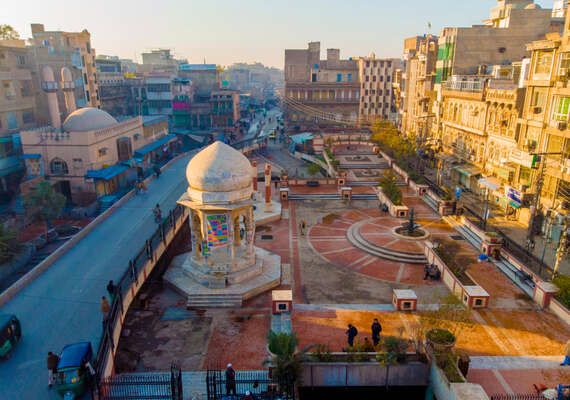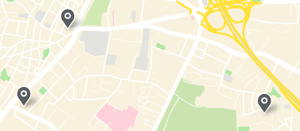Peshawar City Guide

| Country: | Pakistan |
| Known Names: | |
| Language: | Pashto, Urdu |
| Population: | Approx. 1.97 million |
| Religion: | Islam (most common) |
| Area Code: | +92 91 |
| Currency: | Pakistani Rupee (PKR) |
| Time Zone: | Pakistan Standard Time (PST) - UTC/GMT +5 hours |
| Visa: | |
| Consulate: |
General Information / Guide
Peshawar, the capital of Pakistan's Khyber Pakhtunkhwa province, is a gateway to the historic Khyber Pass and a melting pot of cultures from Central Asia, the Middle East, and South Asia. This ancient city is known for its rich history, bustling bazaars, and warm hospitality.
Climate / Weather / When to Go
Peshawar has a semi-arid climate, with hot summers and mild to cold winters. Spring (March to April) and autumn (October to November) are the best seasons to visit, offering pleasant weather and a respite from the extreme heat or cold.
How to Get There
Peshawar International Airport offers flights to major cities in Pakistan and some international destinations. The city is also reachable by road and rail from major Pakistani cities, providing easy access for travelers.
Food / Restaurants / What to Eat and Drink
Peshawar is famous for its traditional Pashtun cuisine, including Chapli Kebab, Peshawari Naan, and Kabuli Pulao. Tea houses serve a variety of traditional teas, a testament to the city's tea culture. For a local dining experience, the Namak Mandi offers authentic tastes of Pashtun cooking in a traditional setting.
Important Places / Places to Visit
- Peshawar Museum: Home to one of the most comprehensive collections of Gandharan art in the world, showcasing Buddhist artifacts and ancient sculptures.
- Bala Hisar Fort: An iconic historical fort offering panoramic views of Peshawar and insight into the region's military history.
- Qissa Khwani Bazaar: A historic marketplace known for its storytelling tea shops, vibrant atmosphere, and an array of traditional goods.
- Jamrud Fort: Located at the entrance to the Khyber Pass, this fort marks the gateway to the historic trade route between Central Asia and the Indian Subcontinent.
- Sethi Houses: A collection of beautifully preserved 19th-century homes showcasing the rich architectural heritage of the merchant families of Peshawar.
- Mahabat Khan Mosque: A stunning example of Mughal architecture, known for its intricate tile work and historical significance in the heart of the old city.
What to Do
Peshawar, a city steeped in history, offers a journey through time with its ancient bazaars, historic sites, and rich cultural heritage. Visit the iconic Qissa Khwani Bazaar for traditional crafts and a taste of the famous Peshawari tea. The Peshawar Museum showcases the region's Buddhist art and Gandhara sculptures, providing insight into its ancient civilizations. Explore the Bab-e-Khyber at the entrance to the Khyber Pass, symbolizing the city's historical significance. Experience the traditional cuisine with a visit to Namak Mandi for authentic Peshawari kebabs. Peshawar's blend of history, culture, and culinary delights makes it a fascinating destination for curious travelers.
Nightlife / Bars / Entertainment
Nightlife in Peshawar is markedly different from the typical Western concept, with a strong focus on cultural and family-friendly entertainment. The city's nightlife revolves around traditional tea houses and family restaurants, where people gather to enjoy local cuisine and chai. For entertainment, there are occasional cultural shows and live Pashto music performances that showcase the region's rich heritage. Cinemas in Peshawar screen both local and international films, providing a glimpse into the storytelling tradition of the area. Though bars and clubs are virtually non-existent due to cultural and legal reasons, Peshawar offers a unique evening experience through its vibrant food scene and cultural gatherings.
Shopping / What to Buy
Peshawar is renowned for its traditional bazaars and handicrafts. The Qissa Khwani Bazaar is a must-visit for those interested in a genuine local shopping experience, offering everything from tribal jewelry to handwoven carpets and textiles. For precious stones and tribal jewelry, head to Namak Mandi and the Bazaar-e-Kalan. Peshawar is also famous for its Peshawari chappals (traditional leather sandals) and intricate woodwork, available in various markets throughout the city. Shopping in Peshawar provides a glimpse into the city's rich history and culture, making it an essential experience for visitors.
Festivals/ Events
April: Chand Raat Festival
May: National Tea Garden Festival
Holidays / Festivals / Important Days
Sundays: Weekly Rest Day
(Varies): Eid al-Fitr
(Varies): Eid al-Adha
(Varies): Ashura
23 March: Pakistan Day
Things to Pay Attention to / Important Information
Security checks are common; carry identification and be patient during inspections.
Urdu is the main language, with Pashto also widely spoken; English may be understood in urban areas.
Be cautious of air quality and avoid outdoor activities on days with high pollution levels.
Respect local traditions and conservative dress codes, especially in non-tourist areas.
Transportation
Peshawar's transport system includes a mix of traditional and modern. The Bus Rapid Transit (BRT) system is a convenient option, operating from 6:00 am to 10:00 pm, with fares from PKR 10 to 50 based on the route. Local buses and minibuses cover wider areas, charging between PKR 20 to 100, depending on the journey's length.
Cycle rickshaws and auto rickshaws are ubiquitous for short distances within the city. Negotiating the fare before the trip is advisable as they don't use meters. Taxis offer a more secure ride, with starting fares at PKR 100 and around PKR 30 per kilometer thereafter. Ride-hailing services provide a reliable alternative, available via smartphone apps across the city.
